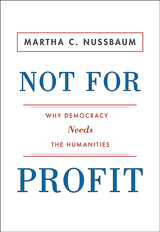Martha Nussbaum's words: “The culture of beauty is the true salt of democracy."
by Luigino Bruni
published on Vita 07/01/2011 «The humanities and the arts are being cut away, in both primary/secondary and college/university education, in virtually every nation of the world. Seen by policy-makers as useless frills, at a time when nations must cut away all useless things in order to stay competitive in the global market, they are rapidly losing their place in curricula, and also in the minds and hearts of parents and children. Indeed, what we might call the humanistic aspects of science and social science— the imaginative, creative aspect, and the aspect of rigorous critical thought—are also losing ground as nations prefer to pursue short-term profit by the cultivation of the useful and highly applied skills suited to profit-making». I believe that this phrase from the American philosopher Martha Nussbaum is the main idea of her latest book, translated in Italian by Mulino, which is entitled Not For Profit: Why Democracy Needs the Humanities.
«The humanities and the arts are being cut away, in both primary/secondary and college/university education, in virtually every nation of the world. Seen by policy-makers as useless frills, at a time when nations must cut away all useless things in order to stay competitive in the global market, they are rapidly losing their place in curricula, and also in the minds and hearts of parents and children. Indeed, what we might call the humanistic aspects of science and social science— the imaginative, creative aspect, and the aspect of rigorous critical thought—are also losing ground as nations prefer to pursue short-term profit by the cultivation of the useful and highly applied skills suited to profit-making». I believe that this phrase from the American philosopher Martha Nussbaum is the main idea of her latest book, translated in Italian by Mulino, which is entitled Not For Profit: Why Democracy Needs the Humanities.
Laws that are not visible
Democracy is a delicate tree, always with roots that aren't profoundly embedded in historical terrain, that asks to be cultivated, attended to, taken care of, above all, in moments of crisis. During her entire scholarly path, Nussbaum has  dedicated a lot of work and civil passion towards democracy, showing us, together with Amartya Sen, the Indian economist Nobel Prize winner for economics in 1998, that development is measured on the axis of freedom and rights, and a little – often incorrectly – on that GDP axis that we are all used to as reference. And without critical intelligence, free and creative thought, freedoms and rights do not grow in our civilizations, simply because people do not succeed in seeing rights and freedoms as precious assets, do not fight for them and willingly exchange them for some more goods.
dedicated a lot of work and civil passion towards democracy, showing us, together with Amartya Sen, the Indian economist Nobel Prize winner for economics in 1998, that development is measured on the axis of freedom and rights, and a little – often incorrectly – on that GDP axis that we are all used to as reference. And without critical intelligence, free and creative thought, freedoms and rights do not grow in our civilizations, simply because people do not succeed in seeing rights and freedoms as precious assets, do not fight for them and willingly exchange them for some more goods.
Humanistic formation is not intended as an elitist good, a luxury good accessible to a few who have talents and financial capability. As Nussbaum recalled in her beautiful lecture held at the “Sophia” University Institute last June 6 in Loppiano, one of her model educators is Tagore who, with his poetry and formative programs in schools, was like Gandhi, at the roots of Indian independence and democracy. Beauty like non-violence are also civil virtues essential for the common good and quality of democracy.
Nussbaum's proposal is for a school, a university, wherein arts, literature, and philosophy are considered fundamental for every citizen's character formation, for without people's interior/spiritual formation (a task in Nations are shelving indispensable knowledge to keep democracy alive which art, music, and literature have not substituted) our societies will not be in a position to manage and orient well the extraordinary conquests of technology and communications for the common good.
In times of crises and epic changes, people and communities who had the common good at heart, saved and renewed civilization with institutions (both political and economical), but also by founding new schools and promoting art: monasticism, then the Franciscans, many religious charisms and modern lay people, the socialist movement, also utilized beauty to “save the world”.
As Olivier Messiaen did when, in that (German) internment camp of Goerlitz, he composed and performed in a shed with some deported musicians the Quatuor pour la fin du temps (Quartet for the End of Time) or how violinist Karel Fröhlich, who in 1944 at Theresienstadt, held a concert for those who were supposed to leave for Auschwitz the next morning.
Don't cut education!
Art and beauty have always kept fighting against death and barbarity, offer instruments for the liberation and progress, civil awareness, and of peoples.
Altogether, the school and education have a fundamental role: «Thirsty for national profit, nations, and their systems of education, are heedlessly discarding skills that are needed to keep democracies alive. If this trend continues, nations all over the world will soon be producing generations of useful machines, rather than complete citizens who can think for themselves, criticize tradition, and understand the significance of another person’s sufferings and achievements. The future of the world’s democracies hangs in the balance».
See article






